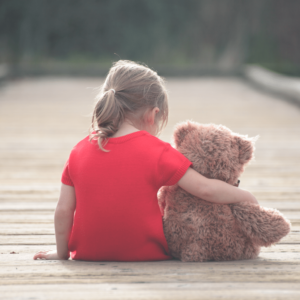“Many people imagine that the hardest time for children of divorce is the moment when their parents first part. That moment is hard, but it is only the beginning. The division and restructuring of childhood that immediately follow, and which continue up to and beyond the point the child leaves home, throw into question aspects of childhood that were once taken for granted and keep the divorce very much alive for years to come. Children become caught up in living between two worlds.” (Elizabeth Marquardt)

Your Divided World
When a couple divorces, it changes everything for the family involved! That’s a pretty easy assumption to make, with little stretch of the imagination.
Not only is the family divided between two worlds as far as where they physically live, but the children are divided in how they emotionally live between the two worlds created by their parent’s divorce. For a lot of them the question is, “How do you love them each without causing problems with one or the other?” How do you juggle their differing life-styles and approaches to how they treat you and straddle their “divided” world?
Observation
In her book, Between Two Worlds: The Inner Lives of Children of Divorce author Elizabeth Marquardt gives the following observation,
“Many changes occur in the wake of divorce. But from the child’s point of view the essential change is this. The child suddenly inherits two distinct worlds in which to grow up.
“We may have been quite young —only four or eight or twelve years old—when our parents split up. How did we take on the task of making sense of two very different worlds? It’s something that our parents largely gave up on, something that all adults have a hard time doing.”
Additionally:
Elizabeth points out,
“Children of divorced parents are more apt than those living in intact families to feel divided between two homes with different values. They’re asked to keep secrets about the different households. They’re left without clear guidance on what’s right and what’s wrong. So they resort to turning instead to friends and siblings. And they’re ‘more apt to struggle with loss, isolation, loneliness and suffering.'”
Furthermore
Then Elizabeth writes:
“To outside observers, the children of divorced parents may look no different than the children of intact parents. We ran on the playground, went to school, and argued with our siblings. We played with blocks, and drew pictures in our bedrooms. But we were also vigilant. When Mom came home we gauged her mood. When we stayed at Dad’s we were often quiet and on good behavior. We paid close attention to the different rules at each parent’s home and the conflicts in their expectations of us. And we wondered if we looked or acted too much like our father and if that made our mother mad at us.
“We struggled to remember what we were not supposed to say. And we struggled on what secrets or information about one parent we should not share with the other. We adjusted ourselves to each of our parents. It was a matter of shaping our habits and beliefs to mimic theirs when we were around them. We often felt like a different person with each of our parents.”
When parents divorce, each spouse must realize that their children will be saddled with the mature responsibility of trying to figure out and balance two very different worlds.
Consequences
“What are some of the consequences of a divided childhood, lived between two worlds?” Elizabeth Marquardt gives the following insights,
“Our study showed that children of divorce, even those who appear to be fine and successful later in life, are much more likely than their peers from intact families to share profound and moving stories of confusion, isolation, and suffering. Most people do not expect children to be deeply absorbed by their parents’ needs and vulnerabilities. But children of divorce often say we were. Most people do not expect children to confront complex moral questions early in life. But as children of divorce we routinely did. Most do not expect children to feel like outsiders in their homes. But we often felt that way. Most do not expect children to keep secrets for their parents. But we often did.
“Likewise, most do not expect that children will approach God from a place of suffering and isolation. But that is how we often explain our spiritual journeys. Most do not expect children to feel like a different person with each of their parents. Yet children of divorce are likely to say we did.
“When our parents divorced we did not just suffer a bump. It did not leave us with a few bruises that quickly faded. Our childhoods were turned inside out.”
Giving Voice
Please know that this article is not written to make anyone feel guilty. It’s written to give children a voice that they may not have had otherwise. It may be that you are considering divorce or that you are already divorced. But it’s important to understand the two completely different worlds your child may be trying to juggle.
If you can stop the divorce process, we hope you will. We hope you will find a way to work together with your spouse so your child’s world does not have to be divided. If you can’t (it may be out of your hands), then you need to be aware of this aspect of your child’s life. This way you can lessen the pain as much as possible.
Recommendation
I highly recommend that you read Elizabeth Marquardt’s book to obtain a better grasp of what has been presented in this article. By going to the following Amazon.com link, you can “CLICK to look inside,” to read a portion of the book. This way you can better know what is in it and what your child is dealing with. But of course, you would benefit the most if you obtain the book and read it in its entirety.
You can do either, by clicking onto the following:
• BETWEEN TWO WORLDS: The Inner Lives of Children of Divorce
“May the God of peace, who through the blood of the eternal covenant brought back from the dead our Lord Jesus, that great Shepherd of the sheep, equip you with everything good for doing His will, and may He work in us what is pleasing to Him, through Jesus Christ to whom be the glory for ever and ever.” (Hebrews 13:20-21)
Cindy Wright of Marriage Missions International wrote this article.
If you have additional tips you can share to help others, please “Join the Discussion” by adding your comments below.
More from Marriage Missions
Filed under: Separation and Divorce






